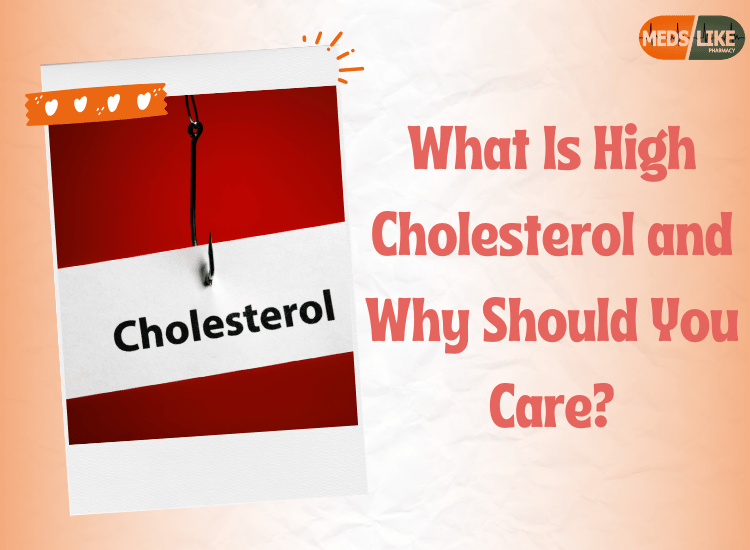In today’s fast-paced world, health problems often creep up silently, and high cholesterol is one of the most common yet overlooked conditions. While it may not show any obvious symptoms, untreated high cholesterol can lead to serious health issues like heart disease and stroke. But what exactly is cholesterol? Why does it matter if it’s high? And what can you do about it?
Let’s break it down.
Understanding Cholesterol
Cholesterol is a waxy, fat-like substance found in every cell of your body. It’s essential for various functions—building cell membranes, producing hormones (like estrogen and testosterone), and making vitamin D.
Your body makes all the it needs, mainly in the liver. However, cholesterol also enters your system through the foods you eat—especially those high in saturated and trans fats.
There are two main types of cholesterol:
- LDL (Low-Density Lipoprotein): Often called “bad cholesterol.” High levels can lead to plaque buildup in your arteries, increasing the risk of heart disease.
- HDL (High-Density Lipoprotein): Known as “good cholesterol.” It helps remove LDL from the bloodstream.
A third component, triglycerides, are another type of fat in your blood. High triglyceride levels combined with high LDL or low HDL levels can further increase heart disease risk.
What Is High Cholesterol?
High cholesterol, or hypercholesterolemia, occurs when there’s too much LDL cholesterol in your blood. This condition can cause fatty deposits to develop in your arteries, making it harder for blood to flow. Over time, this can lead to atherosclerosis, heart attacks, strokes, and other cardiovascular issues.
Since high cholesterol usually has no symptoms, many people are unaware they have it until a major health event occurs. That’s why regular screening is crucial, especially for adults over 20.
Why Should You Care?
1. Heart Disease Is the #1 Killer
According to the World Health Organization (WHO), cardiovascular diseases are the leading cause of death globally. High cholesterol is one of the top risk factors—especially when combined with high blood pressure, smoking, obesity, and diabetes.
2. It Affects People of All Ages
While it’s more common in people over 40, young adults and even children can have high due to genetics, poor diet, and lack of physical activity. Inherited conditions like familial hypercholesterolemia can cause dangerously high cholesterol levels from a young age.
3. It’s Largely Preventable and Manageable
The good news? High cholesterol can be controlled through lifestyle changes, and when necessary, medications. Early intervention greatly reduces your risk of heart attack, stroke, and other complications.
Risk Factors for High Cholesterol
You may be at higher risk for high if you have one or more of the following:
- Poor diet (especially high in saturated fats and processed foods)
- Sedentary lifestyle
- Smoking
- Excessive alcohol intake
- Family history of high or heart disease
- Certain health conditions (e.g., diabetes, hypothyroidism)
How Is High Cholesterol Diagnosed?
A simple blood test called a lipid panel measures your levels, including:
- Total cholesterol
- LDL cholesterol
- HDL cholesterol
- Triglycerides
Here’s a general guideline (in mg/dL):
| Component | Desirable Level |
|---|---|
| Total Cholesterol | Less than 200 |
| LDL (bad) | Less than 100 |
| HDL (good) | 60 or higher (better) |
| Triglycerides | Less than 150 |
Note: Ideal numbers may vary depending on individual health conditions.
How to Lower and Manage High Cholesterol
You can take proactive steps to reduce your cholesterol levels and improve overall heart health:
1. Eat a Heart-Healthy Diet
- Focus on fruits, vegetables, whole grains, and lean proteins.
- Add foods rich in soluble fiber (e.g., oats, beans, apples).
- Include healthy fats like those found in nuts, seeds, and fatty fish (omega-3).
- Limit intake of saturated fats (red meat, full-fat dairy) and trans fats (processed snacks, baked goods).
2. Exercise Regularly
Aim for at least 30 minutes of moderate activity (like brisk walking, cycling, or swimming) most days of the week. Exercise helps raise HDL and lower LDL and triglyceride levels.
3. Maintain a Healthy Weight
Even a small weight loss (5–10% of your body weight) can significantly improve cholesterol levels and reduce cardiovascular risk.
4. Quit Smoking
Smoking lowers HDL cholesterol and damages blood vessels. Quitting has immediate and long-term heart health benefits.
5. Limit Alcohol Consumption
Excessive alcohol can raise triglyceride levels and contribute to high cholesterol. Stick to moderate drinking—1 drink per day for women, 2 for men.
6. Consider Medications (If Needed)
If lifestyle changes aren’t enough, your doctor may prescribe statins or other cholesterol-lowering medications. These are effective but should be used alongside—not instead of—healthy habits.
When to See a Doctor
It’s a good idea to get your cholesterol levels checked:
- Every 4–6 years if you’re a healthy adult over 20
- More often if you have risk factors (e.g., high blood pressure, diabetes, family history)
- As directed by your healthcare provider if you’re already being treated for high cholesterol
Final Thoughts
High cholesterol may not cause symptoms, but it shouldn’t be ignored. It’s one of the clearest indicators of potential heart trouble down the road—and the earlier you act, the better your chances of preventing serious health complications.
The key lies in awareness, early testing, and making heart-smart lifestyle choices. A few changes today can protect your heart for years to come.
So, don’t wait for a health scare. Know your numbers. Make a plan. And take charge of your heart health today.

